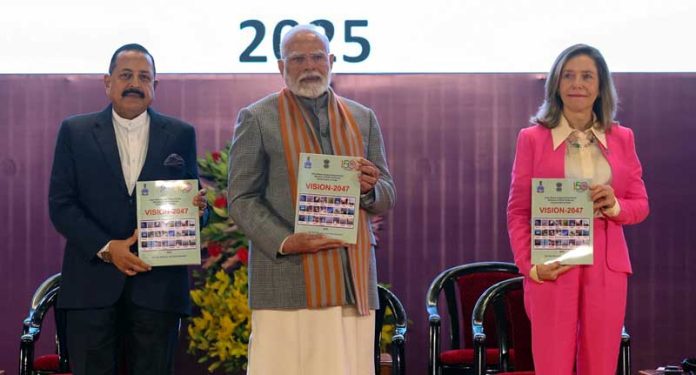
Weather forecast accuracy increases 50% in 10 yrs: Dr Jitendra
Excelsior Correspondent
NEW DELHI, Jan 14: Prime Minister Narendra Modi today urged scientists to develop warning systems for earthquakes while noting that advanced weather forecasts have significantly reduced casualties and minimised economic losses caused by cyclones.
Addressing a function to celebrate 150 years of the India Meteorological Department (IMD), he also lauded the institution as a symbol of India’s scientific journey.
Modi noted how advanced weather forecasting has significantly reduced casualties during cyclones and minimised economic losses, boosting investor confidence and building economic resilience.
Follow the Daily Excelsior channel on WhatsApp
The Prime Minister also launched ‘Mission Mausam’ for developing cutting-edge weather surveillance technologies and systems, implementing high-resolution atmospheric observations, next-generation radars and satellites, and high-performance computers.
The celebrations were attended by the World Meteorological Organisation Secretary General Celeste Saulo, Earth Sciences Minister Dr Jitendra Singh, Earth Sciences Secretary M Ravichandran, IMD Director General Mrutyunjay Mohapatra and a host of dignitaries. Modi also released the IMD’s Vision-2047 document for weather resilience and climate change adaptation, a commemorative postage stamp and a coin to mark 150 years of the IMD.
“Meteorology offers the most important support for the disaster management capability of any country. To minimise the impact of natural disasters, we need to maximise the efficiency of meteorology,” the Prime Minister said.
He said India’s disaster management capabilities have significantly improved due to advancements in meteorological technology which has proved to be beneficial not only for the country but also for the global community.
“Today, our Flash Flood Guidance system provides critical information to neighbouring countries, including Nepal, Bhutan, Bangladesh and Sri Lanka,” Modi said.
The Prime Minister stressed on the need to work with future requirements in mind, including developing warning systems for natural disasters like earthquakes.
“There is a need to develop warning systems for earthquakes and scientists and researchers should work in this direction,” Modi said.
The Prime Minister quoted from scriptures and ancient texts to highlight India’s rich history of expertise in understanding weather patterns.
He said traditional knowledge was well documented, refined, and deeply studied in ancient texts like the Vedas, Samhitas and Surya Siddhanta, Tamil Nadu’s Sangam literature and the folk literature of Ghagh Bhaddari in the north.
Speaking on the occasion Jitendra Singh said “In the last 10 years, the weather related installations in the country increased to more than double while there has been a 50 percent increase in the accuracy of weather forecast and early warning systems since 2014 when the Modi Govt took over.”
Sharing the current status, Dr Jitendra Singh said, “Before 2014, the number of radar stations across the country was just 15; today, we have successfully installed more than double to make it 39 radars. The number of Automated Weather Stations has grown from 700 to 1,500, more than double the number since 2014. Additionally, the number of Balloon Radiosondes was just 33 in 2014, now it has increased to 56.”
The Minister also highlighted some recent initiatives, such as “Nowcast”, which provides weather forecasts up to three hours ahead. Initially limited to 120 cities before 2014, it has now been extended to 1,200 cities.
Dr. Singh, who hails from the Union Territory of Jammu and Kashmir, also shared that the Regional IMD Centre in Srinagar, which has garnered global recognition, is celebrating its centenary year. He reaffirmed that under the visionary leadership of Prime Minister Modi, India is no longer focused on simply predicting the weather for tomorrow but is concentrating on understanding the impact of weather events for the coming days. He expressed confidence that India is poised to emerge as a global leader in weather forecasting capabilities.
Speaking at the foundation day celebration, Celeste Saulo, Secretary-General of WMO, praised IMD’s journey as a testament to India’s commitment to weather forecasting. She highlighted how IMD has maintained its legacy with dedication, embracing technological innovation and resilience in adapting to fast-paced changes in climate and weather. She emphasized the socio-economic impact of these services and their multifaceted benefits.

